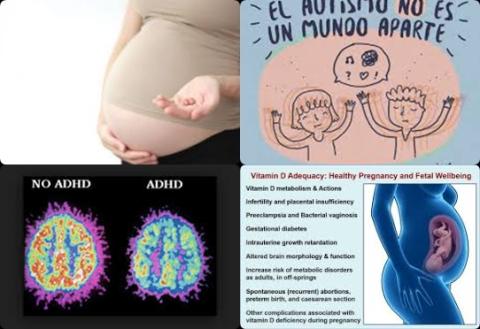
Objectives:
Diverse studies have investigated the impact of prenatal exposure to vitamin D levels on brain development. However, evidence in humans has never been systematically reviewed. Therefore, this meta-analysis (systematic review) has been conducted.
Has a high prenatal vitamin D level positive effect on brain development of the born child?
Study design:
This review article included 25 studies.
Results and conclusions:
The investigators found comparing with the lowest category of prenatal 25(OH)D levels (vitamin D level in blood), the highest prenatal 25(OH)D levels had no significant effects on cognition [pooled beta coefficients = 0.95, 95% CI = -0.03 to 1.93, p = 0.05].
The investigators found comparing with the lowest category of prenatal 25(OH)D levels (vitamin D level in blood), the highest prenatal 25(OH)D levels had no significant effects on psychomotor development [pooled beta coefficients = 0.88, 95% CI = -0.18 to 1.93, p = 0.10].
The investigators found comparing with the lowest category of prenatal 25(OH)D levels (vitamin D level in blood), the highest prenatal 25(OH)D levels significantly reduced risk of ADHD of the born child with 28% [pooled relative risk = 0.72, 95% CI = 0.59 to 0.89, p = 0.002].
The investigators found comparing with the lowest category of prenatal 25(OH)D levels (vitamin D level in blood), the highest prenatal 25(OH)D levels significantly reduced risk of autism-related traits of the born child with 58% [pooled odds ratio = 0.42, 95% CI = 0.25 to 0.71, p = 0.001].
The investigators found there was little evidence for protective effects of high prenatal 25(OH)D for language development and behaviour difficulties of the born child.
The investigators concluded this meta-analysis provides supporting evidence that increased prenatal exposure to 25(OH)D levels is associated with reduced risk of ADHD and autism-related traits of the born child later in life. Associations represent a potentially high public health burden given the current prevalence of vitamin D deficiency and insufficiency among childbearing aging and pregnant women.
Original title:
Neurodevelopmental effects of prenatal vitamin D in humans: systematic review and meta-analysis by García-Serna AM and Morales E.
Link:
https://www.ncbi.nlm.nih.gov/pubmed/30696940
Additional information of El Mondo:
Find more information/studies on vitamin D and pregnancy right here.